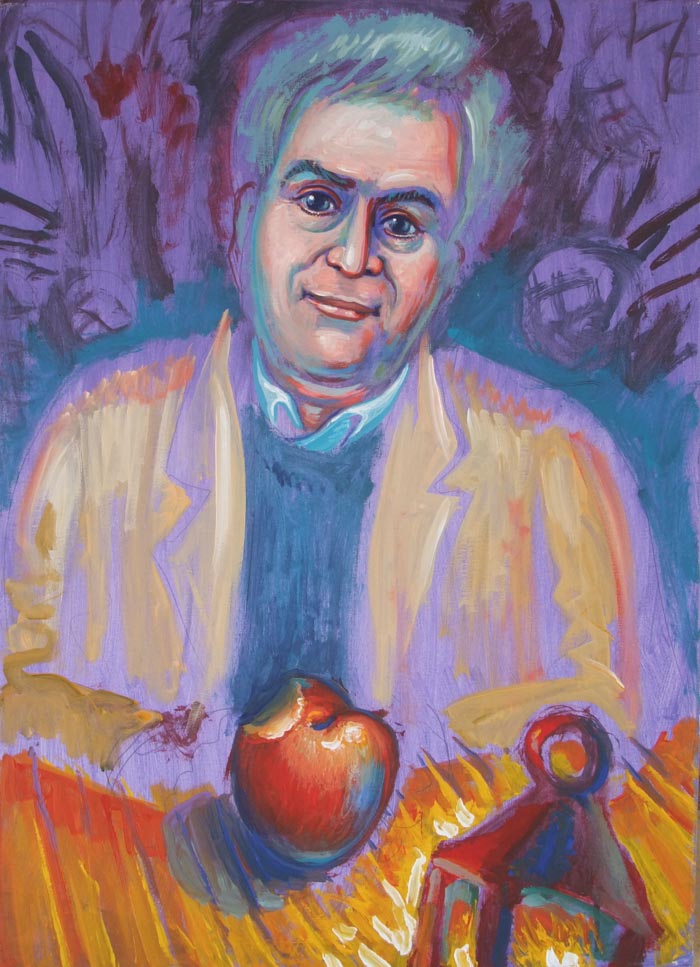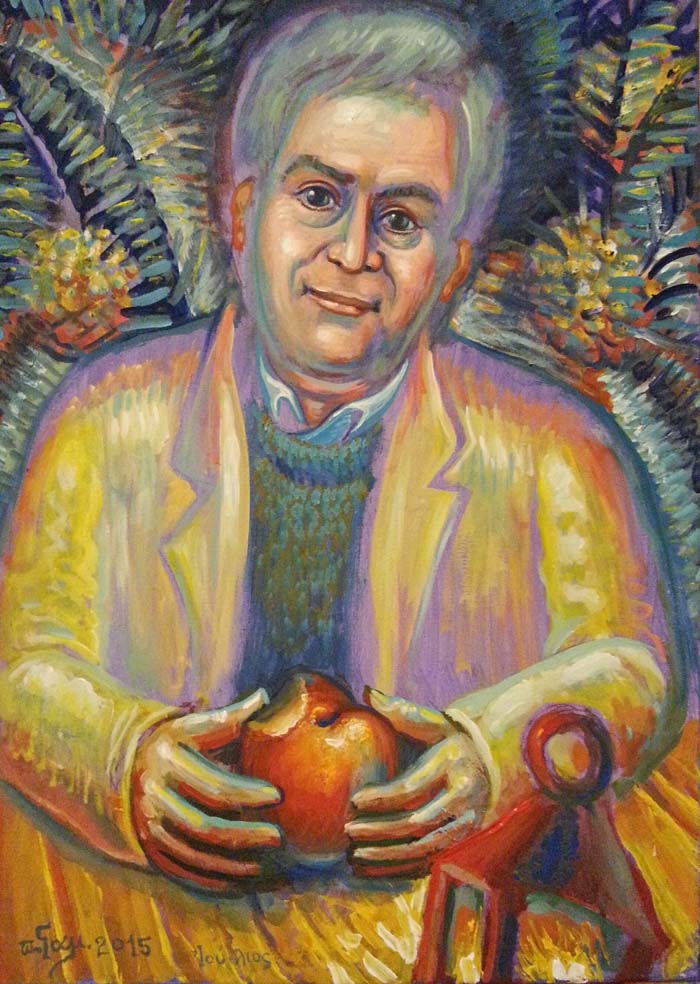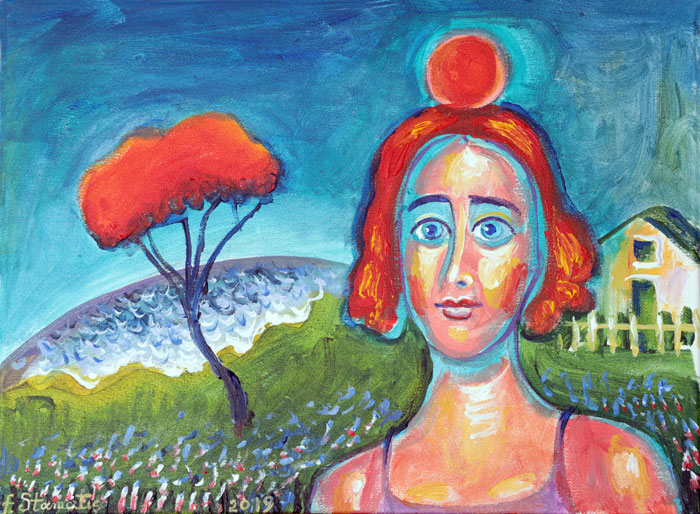An Indian Lady dances and plays music, acrylic on canvas, unfinished, 2013.
Muse Euphrosyne, 60 x 90 cm, Encaustic Painting
Muse Euphrosyne, Detail, 60 x 90 cm, Encaustic Painting
A Pine with Three Cypresses, 13 x 5.6 cm, a very small miniature, encaustic
“Old Stone Bridge in Roscoe, Illinois”, Acrylic on canvas, december 2014
The Portrait of Dr. Dimitrios Kyriazis, unfinished, acrylic on board, 2015
The Portrait of Dr. Dimitrios Kyriazis, unfinished, detail, acrylic on board, 2015
"The Kiss" (Erotokritos), acrylic on canvas, 50x70 cm, 2015
"Το φιλί" (Ἐρωτόκριτος), ακρυλικό σε καμβά, 50x70 εκ., 2015
The Portrait of Dr. Dimitrios Kyriazis, unfinished, acrylic on board, 2015
The Portrait of Dr. Dimitrios Kyriazis, acrylic on board, 2015. Father Stamatis painted Dr. Kyriazis as he arrives (after a trajectory in dark wood) to a light-house which illumines landscape and himself; it symbolizes the words his mother told him when he embarked on his life: "may you have a good enlightenment, my child". Bitten apple symbolizes life experience.
"Before the Moon and the Sea of Santa Barbara", Acrylic on card board, 2015
“Dama Azul”, Acrylic on canvas, Mexico City 2015
"Basket of fruit", acrylic on board, 2015
"St. Luke (the Surgeon) and Albert Schweitzer", acrylic on canvas, by Stamatis Skliris, 2016
"St. Luke (the Surgeon) and Albert Schweitzer", detail: Albert Schweitzer, acrylic on canvas, by Stamatis Skliris, 2016
"St. Luke (the Surgeon) and Albert Schweitzer", detail: St. Luke (the Surgeon), acrylic on canvas, by Stamatis Skliris, 2016
"A Lady Pianist", acrylic on canvas, Athens, 2016. Fr Stamatis explains the creative desire in young lady pianist. The girl is depicted bending forward, in the moment of creativity, composing a new melody, while her eye "reads" the music, with undivided attention to the sound of piano, and the piano becomes elastic and cyclical… It is an ecstatic expression.
Shepherd of the Nativity, Acrylic on canvas, 2017
Angel of the Resurrection, Acrylic on canvas, 2017
"Indian", acrylic on board, 2017
"A Shellfish and a Fish", Egg tempera on wood, 2017
Girl with a Brooch, Acrylic on canvas, by Stamatis Skliris, 2017
King koulourtzis, acrylic on wooden board, 2017
“Melody of Waters”, Acrylic on canvas, December 2017
In this painting we see an abstract approach to the circle of life that water takes. At the bottom there is a lake, from which water evaporates, rises, and creates the clouds that are at the top of the painting. The clouds produce rain, and from the rain, waterfalls are created.
Paralympics winner, acrylic on canvas, 2018
A street vendor selling pastry in Piraeus (Koulourdzis from Piraeus), combination of encaustic technique and acrylics, 2018
“Dama Azul”, Acrylic on canvas, 2017
"The Declaration of Independence", acrylic on canvas, 2018
The mother, on the left, more static, looking from above, with earrings and pearls, in hypothetical dialogue with the daughter.
"Starfish on Red Sand", acrylic on canvas, 2018
"The Elder Abess Gavrilia with Her Angels", acrylic on canvas, 2018
"Orange Steamer", acrylic on canvas, 2018
Nikos Gavriel Pentzikes, acrylic on canvas, 2018
"An Orange Who Gives All", acrylic on board, 2018
Shepherd Flutist, acrylic on canvas, 2018
"Red Boat with a Red Moon", acrylic on board, 2018
The desperate (Η απεγνωσμένη), acrylic on board, 2018
Dostoyevsky, acrylic on canvas, 2018
At first, I was thinking of filling the background with thick snow and the hero wearing a thick vest. I rendered the face with a transparent turquoise color, peripherally, and once I saw how the face is shining from the white color of the canvas I changed and left the canvas uncolored. When I saw that the portrait is unfinished, I thought that the cold snow was rendered as if it were inside and not around it.
The Paradisiacal, acrylic on canvas, 2018
"The captain dodges the island with a festive ship decorated with flags", 2018.
"An Indian on a White Horse", 2018.
An Aged Man, acrylic on canvas, 2018
A Girl Who Prays, acrylic on canvas, 2018
"A Couple Sailing to a Small Island", acrylic on canvas, 2018
"Εxcessive People", acrylic on canvas, Stamatis Skliris, February 2019
Starting with the news about the refugees whom we consider to be "excesses", unnecessarily (since there is no place for them,) Fr. Stamatis began a dark canvas painting honoring the migrants and as repentance for neglect of their breaking stories. This image of "excessive people" will become even darker over the years to come.
"A Couple Sailing to a Small Island", acrylic on canvas, 2018
Basket with Fruits, 2018
А Shellfish with a Little Fish, acrylic on canvas, 2019
Dolphin, Little Dolphin, acrylic on canvas, 2019
"Lambri", or "How the Orthodox celebrate the Night of the Resurrection", acrylic on canvas, 2019
It is a gladness of soul, a record of the Eucharist's experience, that all these years I thanked my Parish, with all these people of God who came to for the vigil on the Holy Saturday night outside the temple with smiling faces and candles in their hands and celebrating Christ who was THEIR OWN.
"The Boat we are Waiting for", acrylic on canvas, Santa Barbara, 2019
Portrait of a Friend, acrylic on canvas, 2019
A Portrait of a Girl, acrylic on paper, 2019
A Portrait of a Girl, acrylic on cardboard, California 2019
"The Boat we are Waiting for", acrylic on canvas, Half Moon Bay, 2019
White Magpie, acrylic on canvas, 2019
Wild Horse, acrylic on canvas, 2012
Wonder Lake, acrylic on canvas, 2019 by Stamatis Skliris and Kosta Bojovic
"The King and Ambiguous Oracle", acrylic on canvas, 2021, Stamatis Skliris
"You will go, you will (not) return, you will (not) die in the war"; ἥξεις ἀφήξεις οὐκ ἐν πολέμῳ θνήξεις. The phrase is attributed to Pythia the oracle of Delphi and signifies the ambiguity in the answers of oracles. This phrase could be taken to mean either that you were going to die or you weren't, depending on where you thought the sentence broke (after or before the word οὐκ); used even today to indicate an ambiguous meaning.
"Tropical Landscape", Stamatis Skliris, acrylic on canvas, 2020
"Captain", acrylic on canvas, 2019
"St. Luke of Simferopol and Crimea performs surgery", acrylic on canvas, Stamatis Skliris, 2020
A Vase with "Three Colors", acrylic on canvas, Stamatis Skliris, 2020
“A Window to the Aegean”, acrylic on canvas, Stamatis Skliris, April 7, 2020
Fr. Stamatis painted the painting (which continues the series with Aegean landscapes, which move him very much anyway) wondering how difficult it is for everyone to stay indoors. He proposes aesthetic solutions that open the visual horizon of any person who remains confined to four walls of one room. He suggests hanging photos and paintings on the walls with landscapes that offer our eyes wide horizons and pleasant landscapes, which amuse boredom. In fact, the painting that will function figuratively as a psychic window has a painted window, from which we enjoy the landscape of the Aegean island with the chapel, the ancient remains, and the boat and with the girl who treats us all with the desired fresh watermelon. Ontologically, we live at home, but aesthetically we also enjoy holidays in our favorite Aegean. Good endurance and blessed Pascha to everyone! May we all exit our homes, when God allows!
"My Life Ascended from Corruption toward Thee, o Lord", acrylic on canvas, 2020
"Exupery and His Little Prince", acrylic on canvas, Stamatis Skliris, 2018
Landscapes and beasts
Last night at 2 am (May 24, 2020) I drew the plans and then painted the canvas and called it “O GEROS TIGRIS”. Then I wrote on the back of the funny painting the (supposedly) ancient saying “he who gives landscape, gives also the beasts” and I signed it as “Anaximandrophilus Piraeus, end of the 1st century BC”, meaning the philosophy of the decline of Greco-Roman times.
"Maiden 1" (Fayum style), acrylic on canvas, Stamatis Skliris, 2021
"Philosopher" (Fayum style), acrylic on canvas, Stamatis Skliris, 2021
See this painting as an example of a portrait with "internal mobility". Although a fixed head is presented, it has internal mobility. This is due to 1) the intense wave of the beards, 2) the right eyebrow (as we look), a break to the right, 3) the hairs that cover the ear, 4) the "questioning gaze" characterized by great thoughtful mobility, showing the unbridled concern of the gaze which is constantly questioned.
Socrates, "I know that I know nothing", acrylic on canvas, 2021
It should be noted that this (ἓν οἶδα ὅτι οὐδὲν οἶδα) is not recorded anywhere as a saying that Greek philosopher Socrates said, but only oral tradition exists, derived from Plato's account. But allow me a "poetic permission" to have painted it as an emblematic saying that summarizes the (as much as they could have it) HUMILITY OF THE ANCIENT PHILOSOPHICAL SPIRIT. And I also send a message to us "supposedly" theologians, to never believe that... we know God.
"March 8, Women's Day with Bengal Guns", acrylic on canvas, 2021, Stamatis Skliris
"Wild Horses of Mongolia", acrylic on canvas, March 2021, Stamatis Skliris
"Santorini", acrylic on wooden board, Stamatis Skliris, 2021
"Story About a Very Sensitive Rose, or the Rose and Its Company"
"The Underground Man", acrylic on canvas, Stamatis Skliris, 2021
"Dostoevsky in the Prison Ship ", acrylic on canvas, Stamatis Skliris, 2021
Attempting to trace Dostoevsky’s portrait visually, I started studying the shocking wound which I cut off the painting of the great established Greek painter Nektarios Mamais. It is not a human wound but the wound of a fig opuntia or prickly pear. Mamais painted one such wound in the plant’s body, and it referred me to the person of Dostoevsky, which revealed the spiritual injury of the writer when he was sentenced to prison. My painting “Dostoevsky in the Prison Ship” is about the wound. Although there is no wound visible to the eye on the artwork, it exists inherent in the heart of the painted long sentenced Dostoevsky. The wound and the attitude towards the nothingness hinting at the wound gave birth to the epic works of Dostoevsky. - Stamatis Skliris
"White Nights by Dostoevsky", acrylic on canvas, 2021, by fr. Stamatis Skliris
"Sonia Marmeladova", acrylic on canvas, 2021
"Smerdiakov", acrylic on canvas, 2021
“The Prophet of the Dome”, acrylic on canvas, 2021
Holy New-Martyrs, acrylic on canvas, Stamatis Skliris, 2021
“Melody of Waters”, acrylic on canvas, by father Stamatis and bishop Maxim, 2021
"Two Friendly Lemons", acrylic on canvas, Stamatis Skliris, Neo Psychiko 27-11-2021
When the death was coming back, the table lifts two lemons on its shoulders and together with the ominous red back wall delimits a space experienced with seriousness and perhaps patience. Although the lemons are shiny, their skin looks tormented. And they each have a snout that half-bends and this crouch creaks in our soul as if they are kneeling with patient obedience to their destiny to squeeze and throw themselves out loud. They still stand dour and vigorous, promising awakening and liveliness. But their beak goes to sting their shadow, which they know as a fleeting and non-existent echo of two passing beings ... Every shadow is as fleeting as the being that causes it.
Father Stamatis Skliris
"Indian Woman", acrylic on paper of the sous plat of "HYGEIA hospital" in Athens, after the operation to remove bile stone, Stamatis Skliris, Wednesday 29-6-2022.
At first glance, it is not something that impresses. But I want to emphasize that she succeeded as a painting that presents us after a deep dive into her soul, a girl very deeply sad. The Indian women have this, to carry a calm permanent sorrow. (Fr Stamatis Skliris)
"Stalker", acrylic on canvas, Stamatis Skliris, 2023
"Horses in the Rain (from the Film 'Andrei Rublev')", acrylics on canvas, 80x60 cm, Stamatis Skliris, 2023
"The Golden Fingers of the Wind", 130 x 200 cm, acrylic on canvas, fr. Stamatis Skliris, 2024

































































































































